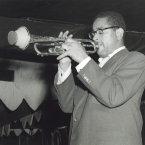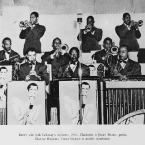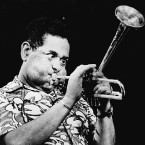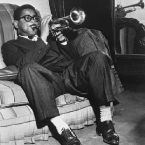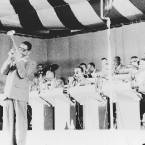Gillespie, “Dizzy” John Birks (1917-1993)
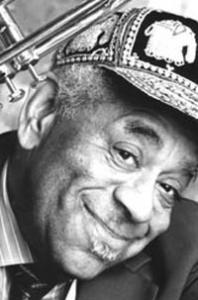
One of the greatest pioneers of modern jazz in the history of this American art form, one of the country’s greatest trumpeters and bandleaders, and South Carolina’s most celebrated jazz musician, composer and bandleader; born in Cheraw, South Carolina where his father was an amateur bandleader; he studied the trumpet at age 14 and prior to that, studied the trombone; some of his earliest gigs were with the Frankie Fairfax band where his nickname Dizzy was given to him because of his outlandish antics; he emerged in the 1940’s as a pioneer of bebop – the master of bebop trumpet players; self-taught musician who won a scholarship to formally study music at the Laurinburg Institute in North Carolina; first recordings were with Teddy Hill’s band where he replaced Roy Eldridge; he worked with Al Cooper’s Savoy Sultans and Mercer Ellington’s band in 1939; his most memorable gigs were with Cab Calloway’s band (1939-1941) where he met Charlie Parker in Kansas City in 1940 and Cuban trumpeter, Mario Bauza from whom he learned Afro-Cuban rhythms; in 1941, he began playing nightly gigs at Harlem’s Minton’s Playhouse; Gillespie worked with Lucky Millinder, Charlie Barnet, Les Hite, Benny Carter, Coleman Hawkins, Ella Fitzgerald, Duke Ellington, Billy Eckstine, Stan Kenton, Thelonious Monk, Art Blakey, Sonny Stitt, Kai Winding, Al McKibbon, and Earl “Fatha” Hines where he worked with Charlie Parker and others to develop bebop; his earliest bebop recording was his famous tune, “Salt Peanuts”; other notable recordings are “Little John Special,” “Groovin’ High,” “Dizzy Atmosphere,” and “Hot House”; in 1945 and later he organized his own bands and recorded under the Victor label (“Cubana Be/Cubana Bop,” “Good Bait,” “Manteca,” and “Ool-Ya-Koo”), recorded on his own label (Dee Gee), toured around the world for the State Department in 1956 and with Norman Granz’ Jazz at the Philharmonic, and recorded with Charlie Parker on the Debut and Clef labels; he led his own bands from the 1950s-1980s and featured several musicians in his big band including saxophonists Jimmy Heath, James Moody, John Coltrane, Yusef Lateef and others; his rhythm section consisted of John Lewis, Milt Jackson, Kenny Clarke and Ray Brown that later became the original Modern Jazz Quartet; he was elected by the Readers into the Down Beat Hall of Fame in 1960, and was awarded a Kennedy Center Honor in 1990; his autobiography, To Be or Not to Bop: The Autobiography of Dizzy Gillespie was written with Gillespie by Charleston native and jazz historian/author, Dr. Wilmot “Al” Fraser.
Image Gallery
Selected Albums
Video
